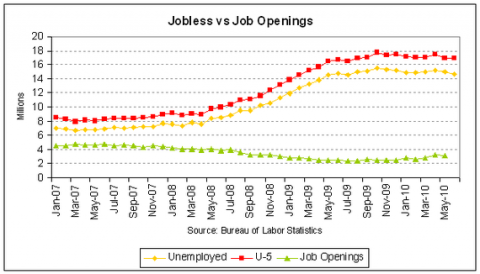Reemployment Bonuses and the Long-Term Unemployed
We’re going to need a lot more examination of government programs to help the long-term unemployed in the years to come. At The Wall Street Journal, Phil Izzo
Jul 31, 20208.3K Shares297.7K Views
We’re going to need a lot more examination of government programs to help the long-term unemployedin the years to come. At The Wall Street Journal, Phil Izzo has a short piece on an academic study of such programs, suggesting that a stick can be more effectivethan a carrot:
“„[A Dutch study, linked here] examine[d] the effects of both postitive and negative financial incentives on the long-term jobless in Rotterdam. In the early 2000s the city ran a program that provided reemployment bonuses for job seekers who were able to find a job and hold it for at least six months. At the same time, benefit recipients who didn’t actively look for work, or otherwise failed to comply with eligibility requirements, would be subject to a temporary reduction in their benefits. “Our main findings are that reemployment bonuses don’t seem to have worked, while benefit sanctions increased the job finding rate significantly,” the economists write.
I’ve been reading up on reemployment bonuses and other programs targeted at aiding the long-term unemployed, and other studies show quite the opposite. Here is one paperfrom the Upjohn Institute on effective reemployment bonus programs:
“„Between 1984 and 1989, four reemployment bonus experiments were conducted on unemployment insurance (UI) recipients in Illinois, New Jersey, Washington, and Pennsylvania. These experiments offered lump sum payments to UI recipients who began new jobs within a prescribed period and remained employed for at least four months. The bonuses were designed to speed reemployment of UI recipients and thereby reduce UI benefit payments. Findings from the four experiments demonstrated that, as expected, the reemployment bonuses reduced UI payments. However, the reductions in payments were usually not large enough to fully cover the costs of paying and administering the bonuses.
Either way, reemployment bonus or sanction programs will do no good if there are no jobs for unemployed workers to obtain. Yesterday, the latest Job Openings and Labor Turnover Survey (or JOLTS) data came out. The trend is good, but there are still 4.7 job seekersfor every job. (In good economic times, there will be one or two job seekers per job.) Daniel Indiviglio at The Atlantic has the best graphshowing the yawning gap between available workers and available jobs:
All of which points to a need to expand programs like this one, the HIRE Act, that provide employers with tax breaksfor picking up workers — a program to make jobs* *rather than hurry job seekers, who need extended unemployment benefits in the meantime.

Paula M. Graham
Reviewer
Latest Articles
Popular Articles
